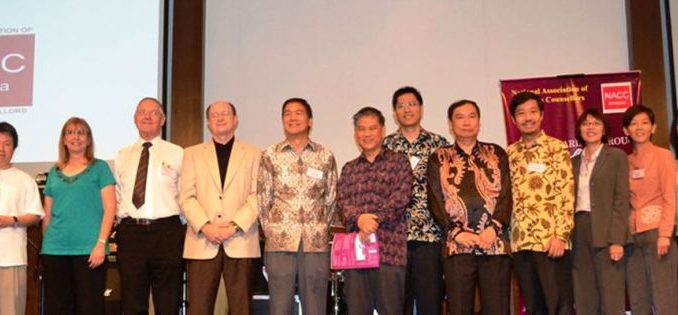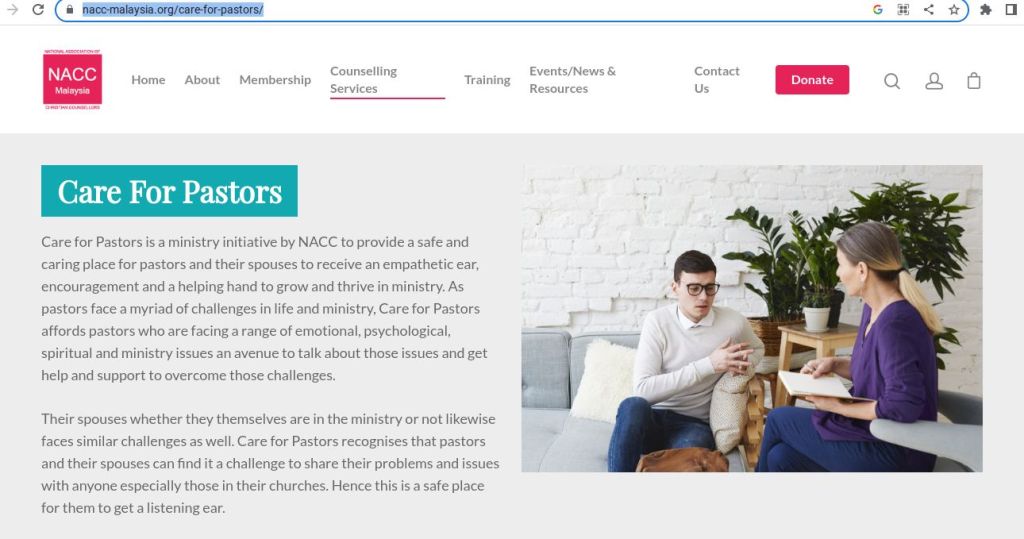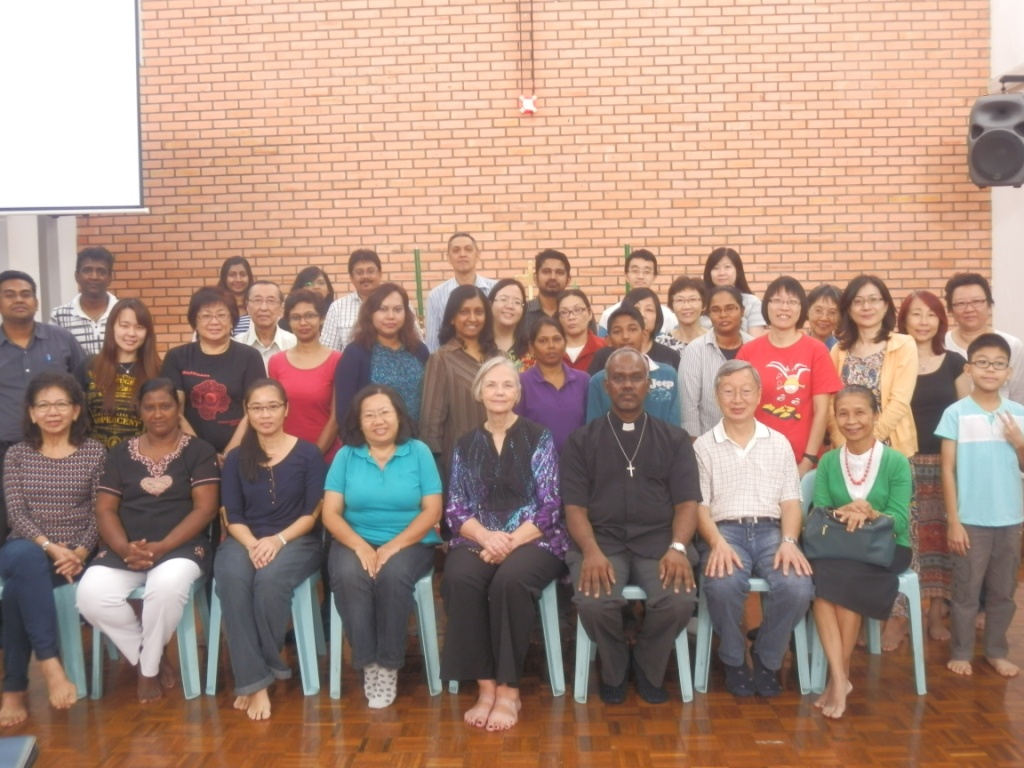
In a conservative nation, there is often a stigma surrounding emotional and mental health support. Yet, in an increasingly disconnected and fast-paced world, there is a growing and pressing need in our current era for such support. Recently, we read about King Saul and about the Weight of Leadership Responsibility and the Importance of Emotional and Wise Support Base and in Addressing Mental and Emotional Well-being.

Few groups are as vulnerable as pastors for they are in the front-line of spiritual battles. Emotional and mental health is crucial for pastors, as they play a unique and challenging role in their communities. In addition to their other services, NACC Malaysia now also provides a Care for Pastors ministry initiative which had its start in March this year. Recently, we chatted with Rev Calvin Lee, one of the Carer leaders under the new ministry. He shares many insights about this important area of ministry:
A Chat with Pr Calvin Lee on the Care for Pastors Ministry
What inspired you to be both a counselor and a pastor? How relevant would you say counseling is to pastors? Were there factors during your years growing up as Christian that played a role in taking up both these roles?
I started out as a pastor first having received my calling in my 20s. After my graduation with a degree in theology from the Bible College of Malaysia, I served in a pastoral capacity for about 14 years before I started asking myself how and where should I develop myself, training-wise. Should I do a masters in theology? Strangely at that time my inclination was not towards theology. I felt that it would be better for me to develop myself for the ministry in more practical ways. Hence, I believe God planted the idea of doing a masters in counseling which in the early 2000s was not exactly a field of study that is popular or established. It just clicked within me that this is what I should go for. Looking back I believe God had laid the foundation for my current ministry in counseling. I believe that I will be a better pastor with the counseling training and vice versa.
Counseling is what all pastors do. Pastors are more likely to be doing pastoral counseling or spiritual counseling which can be quite monofocal as in dealing with spiritual issues within their pastoral roles. Pastoral counseling tends to be related to the giving of pastoral care and support. Professional counseling is more formal and systematic. I would think that professional counseling training enhances a pastor’s work in the ministry very much more. The care given would be more holistic when a pastor is able to grasp beyond the spiritual elements and engages other aspects of a person’s being into helping the person navigate through life’s challenges.
I am called to the ministry and hence I am now a pastor. God’s call came to me in my youth. There has not been any identifiable factors however that led me to be a counselor. The closest to it perhaps could be the idea that came to me in the course of my ministry that Christians would be more victorious and hence be able to lived up to their full potential of who God has called them to be if they are free of the physical, emotional, spiritual, mental and social baggages that weigh them down especially those they have accumulated prior to them becoming Christians.
When and where did the mission/vision to start this service for pastors began in Malaysia? In your experience, how aware are Malaysians of the importance of emotional and mental support for their pastors?
I graduated with my Master in Counseling from HELP University in 2011. But it was only in 2022 after I left my pastorate that I began to consider starting this service for pastors in Malaysia. A chance encounter with the President of the National Association of Christian Counselors, Malaysia, Mr Patrick Cheng, led us to discuss starting this initiative under the NACC. I believe this is divinely arranged as NACC also has the desire to do something for pastors in Malaysia.
Awareness of mental health issues are still lacking in the general population even though times are changing and there is greater awareness nowadays since the Covid epidemic. But the importance of emotional and mental support for pastors is not something Christians have considered much before and now. Churches have been more concerned about pastors’ effectiveness and productivity – whether churches are growing and how well members are being taking care of.
Sadly, no one really talks about pastors’ emotional and mental well-being. This cannot be blamed on anyone because we are not used to such considerations. But the reality is most pastors find themselves in a very stressful environment all the time. That takes a huge toll on them, no less their mental health. Burnouts, family neglect in the name of ministry, marriage breakups, children rebellion, financial difficulties, church conflicts, 24 hours on call, lack of boundaries, guilt and shame etc – these are just some samplings of issues and challenges pastors face.

Can you share how/where the original idea of the Care for Pastors ministry was first formed in Malaysia? Did you and your team have a specific expectation, vision, and mission for the ministry when it was first set up? What helped to shape those visions and missions during the early period?
Care for Pastors ministry is founded to provide a safe and caring place for pastors and their families to receive counseling, encouragement, and resources to grow and thrive in ministry. It aims to provide professional counselling services to church pastors who are facing a range of emotional, psychological, spiritual and ministry issues that might impact their well-being and their ability to lead and minister. In the future we will also be including care and support services for pastors’ spouses and children.
Why the Need for Care for Pastors Ministry
- Pastors play a vital role in the spiritual and emotional well-being of their congregations. However, pastors often face numerous stressors and responsibilities that can take a toll on their mental health.
- This ministry aims to address these concerns by offering dedicated care, counseling and support services specific to the needs of pastors.
- To the best of knowledge there are currently not many such dedicated services available to pastors
Objectives
The Care for Pastors ministry has the following objectives:
- Provide a safe, confidential and non-judgmental space for pastors to express their thoughts, emotions, and concerns.
- Offer professional counseling support to help pastors navigate personal and ministry-related challenges, such as burnout, stress, emotional struggles, relationship issues, handling conflicts within the church and addressing spiritual doubts.
- Enhance pastors’ emotional well-being and resilience, enabling them to fulfil their roles more effectively and maintain healthier relationships with their congregations and families.
- Equip pastors with effective coping strategies and self-care techniques to promote long-term well-being.
- Foster a culture of emotional support and care within the Church in Malaysia recognizing the importance of caring for pastors’ mental and emotional health.
- Foster a network of peer support among pastors, encouraging collaboration and the sharing of experiences and best practices.

Were there any challenges during the early period [originally in the questionnaire “years”] of the ministry? How open were Malaysian pastors in coming for help? How did you and your ministry team handle these formative challenges?
We only just started this March 2024. Hardly a year into it. So far the response has been considered good as some pastors have reached out to engage our help. The word still needs to get out to more pastors. This is our main challenge. We will try to engage more with Christian national bodies, pastors’ fellowships and churches. We will also employ the use of social media to spread the word so that pastors come to know there is such a service available to them now.
In terms of Christ’s role in your ministry, how have the Lord guided (and inspired) you and your team in your care for the pastors that came for help?
Whatever we do in the ministry is essentially driven by God’s calling, leading and direction. Helping pastors comes down to being aware of their unique challenges and how difficult it has been for pastors to call for help. There is so much stigma to that, some of which includes being perceived as being spiritually weak to seek help or guilt and condemnation for being in such a mental or emotional state. The Care for Pastors team of counselors are guided by the need to support pastors in fulfilling their call effectively.
What would you say are the most crucial/important aspects for carers in this ministry? In regards to pastors, what need is their most common – or crucial – in helping them?
To provide that safe space for pastors to come to us. Pastors can be assured that they can be themselves and be free to share and not be judged for their struggles whatever those may be. The carers must maintain compassion and empathy at all times while at the same time give the assurance that whatever the pastors share with them will be strictly held in confidentiality. Major issues that pastors would face I think should be in the areas of conflicts, expectations, burnouts and ministry fatigue.
A distinctive aspect of the Care for Pastors experience is a pastor’s willingness and capacity to be open towards the ministry. There is (or may be) a fear/mindset that the leader of the flock cannot show weakness in front of their congregation. What would your advice on how pastors can overcome this fear and adapt to the culture shock needed for them to receive help from the ministry?
To these pastors, I would say it is a fallacy or faulty thinking that had creeped into their minds. While I can relate to that being a pastor myself, that can be counterproductive as members can also find it hard to relate to their shepherd who seemingly is faultless or too spiritual. I have had members come up to me before telling me they are so relieved that I also face the same struggles as them. What can you say to that? Pastors are often perceived as being too high and mighty! But even more tragic is when members expect their pastors to be perfect and faultless. Can we then blame pastors for having to put up a front that they are not weak? That they have no problems, no struggles?
I would tell pastors that under our ministry it is ok for them to be who they are and not try to be who they are not. It is ok and safe to display weakness and vulnerability. After all Jesus had assured that those who are weak will be strengthened by His grace and power (2 Cor 12:9).

An important aspect of this is the confidentiality of the pastor. How do you ensure and encourage them that their privacy would be protected?
The carers are bound by the ethics in the counseling profession to uphold confidentiality. Confidentiality and privacy afford a safe space for pastors to seek guidance, support and personal growth. It is crucial to the success of the counseling that pastors are assured of confidentiality and privacy which means no one can have access to any client files and information.
Under Care for Pastors, there are Onsite and Virtual Care. Can you share/elaborate the difference between the two? What should pastors expect from each?
Onsite care are the physical sessions where the counselor and the pastor meet face to face. Virtual care is an option for those who find it challenging to turn up for onsite counseling especially if they are not from the same town or city as the counselor.

What expectations should the pastors have in terms of charges for the service?
There is a small charge for the services which helps to ensure pastors’ commitment to the sessions and commitment to work for change. For those who cannot afford they can request for a waiver subject to meeting certain criteria. Pastors can write to me (calvinlee.nacc@gmail.com) for more details on this. We thank God that there has been some donations to provide funding for such waivers. So those who need help will not be turned away simply because they cannot afford to pay.
What would you say is/are the greatest reward(s) you and your team have gained as counselors for pastors?
If I may speak for the rest, it is the feeling that we can be there for the pastors seeking help. God has equipped us for the work and being able to utilise what we have been trained in for His ministry is rewarding because it is meaningful. We are God’s partners in a brand new way.
What are your opinions on how the current perception and Christian’s openness/readiness towards emotional and mental health care shape the Church overall in Malaysia? How can we educate Christians on this aspect?
The landscape of emotional and mental health care within the Christian community in Malaysia has seen considerable evolution in recent years. Traditionally, discussions about mental health were taboo, often intertwined with notions of spiritual weakness or a lack of faith. However, this perception has been gradually changing. Praise the Lord!
There are more churches now in Malaysia who have started to recognize the importance of mental and emotional well-being and have begun incorporating mental health awareness and services into their ministries. Yet there are still many who have yet to think mental health is important enough for them to deal with preferring to leave it to society and the so-called experts to handle it.
Educating Christians about emotional and mental health care is crucial for fostering a supportive and understanding church environment. Here are some strategies that can be employed:
1. Incorporate Mental Health Education into Church Programmes
- Sermons and Bible Studies: Pastors and church leaders can incorporate mental health topics into their sermons and Bible studies. Using scriptural references to highlight the importance of mental and emotional well-being can help bridge the gap between faith and mental health care.
- Workshops and Seminars: Organizing workshops and seminars led by mental health professionals can provide valuable information and resources to congregants. These events can cover a range of topics, such as stress management, coping strategies, and the importance of self-care.
2. Provide Access to Resources and Support
- Counseling Services: Churches can offer counseling services to their members, either by employing a licensed counselor or by partnering with local mental health organizations. Providing access to professional support can help individuals navigate their mental health struggles more effectively. NACC has a Certificate in Lay Christian Counseling programme that churches can consider to train their lay counselors.
- Support Groups: Establishing support groups within the church can provide a safe space for individuals to share their experiences and receive support from others who are going through similar challenges.
3. Foster Open Dialogue and Discussion
- Testimonies and Personal Stories: Encouraging church members to share their testimonies and personal stories related to mental health can help break down barriers and reduce stigma. These stories can provide hope and encouragement to others who are struggling.
- Q&A Sessions and Panel Discussions: Hosting Q&A sessions and panel discussions on mental health topics can provide a platform for open dialogue and education. These events can be facilitated by mental health professionals and church leaders to ensure a balanced and informative discussion.
4. Utilize Media and Technology
- Social Media Campaigns: Churches can use social media platforms to share information, resources, and personal stories related to mental health. These campaigns can reach a wider audience and encourage open discussion about mental health issues.
- Online Resources and Support: Providing online resources and support, such as articles, videos, and webinars, can help educate and inform congregants about mental health. These resources can be accessed at any time, making them a convenient and valuable tool for ongoing education.

How important do you feel the role of discipleship is in the context of caring for the emotional and mental health of other Christians?
The role of discipleship is pivotal in the context of caring for the emotional and mental health of other Christians, acting as both a spiritual and relational anchor.
Jesus invested deeply in His disciples’ lives, engaging in conversations, providing guidance, and modeling how to live a life pleasing to God. His approach shows the importance of walking alongside others through life’s challenges (Mark 3:14, Luke 24:15-16). He also often provided teachings that addressed both spiritual and emotional needs, such as His Sermon on the Mount, which included themes of worry, anxiety, and comfort (Matthew 5-7).
Paul, in his letters, demonstrates how he cared for the churches he planted, addressing both spiritual and emotional well-being (2 Corinthians 1:3-7, 1 Thessalonians 5:11). He encouraged disciples to support each other, to bear each other’s burdens, and to be compassionate and patient, demonstrating a holistic approach to discipleship that includes emotional care (Galatians 6:1-2, Colossians 3:12-14).
The role of discipleship in caring for the emotional and mental health of other Christians is both vital and multifaceted. It provides a framework for holistic care that addresses spiritual, emotional, and mental needs, fostering a supportive and nurturing environment within the Christian community. While there are challenges and limitations, with proper training and awareness, discipleship can significantly contribute to the well-being and resilience of individuals, reflecting the love and compassion of Christ in tangible ways.
Based on your personal experience, what advice would you give to Christians who aspire to take up this field of ministry in terms of sustenance, challenges, and expectations?
You must know what you are in for. Not everyone is suited for and is called to such a ministry. So do your due diligence – find out more. Speak to those in the field – secular and Christians. Be prepared for what is expected of you in this ministry. Having said so, it is a rewarding ministry nonetheless especially when people turn to Christ and accept Him as their Lord and Saviour through the compassionate work of counseling.

Pr Calvin Lee is one among a team of Carers at NACC’s Care for Pastors ministry. While he has a list of qualifications, he conveyed to us that the focus should be placed on the Care for Pastors and NACC’s ministry. You can read about the immense importance and value for counseling among pastors here. Christianity Malaysia would like to thank Pr Calvin for his hospitality, and kind and generous help and insights in producing this article.
The Care for Pastors is an NACC initiative that offers a safe and supportive environment for pastors and their spouses to receive empathy, encouragement, and assistance in overcoming the challenges they face in life and ministry. Recognizing the unique emotional, psychological, spiritual, and ministry-related issues they encounter, the initiative provides a confidential space where they can openly discuss their struggles and receive the help they need to thrive. Find out more about the initiative, the team of Carers, and how they can minister by providing the support and guidance needed to navigate the challenges of pastoral ministry (The Care for Pastors ministry, NACC).
|Share The Good News|




Leave a Reply